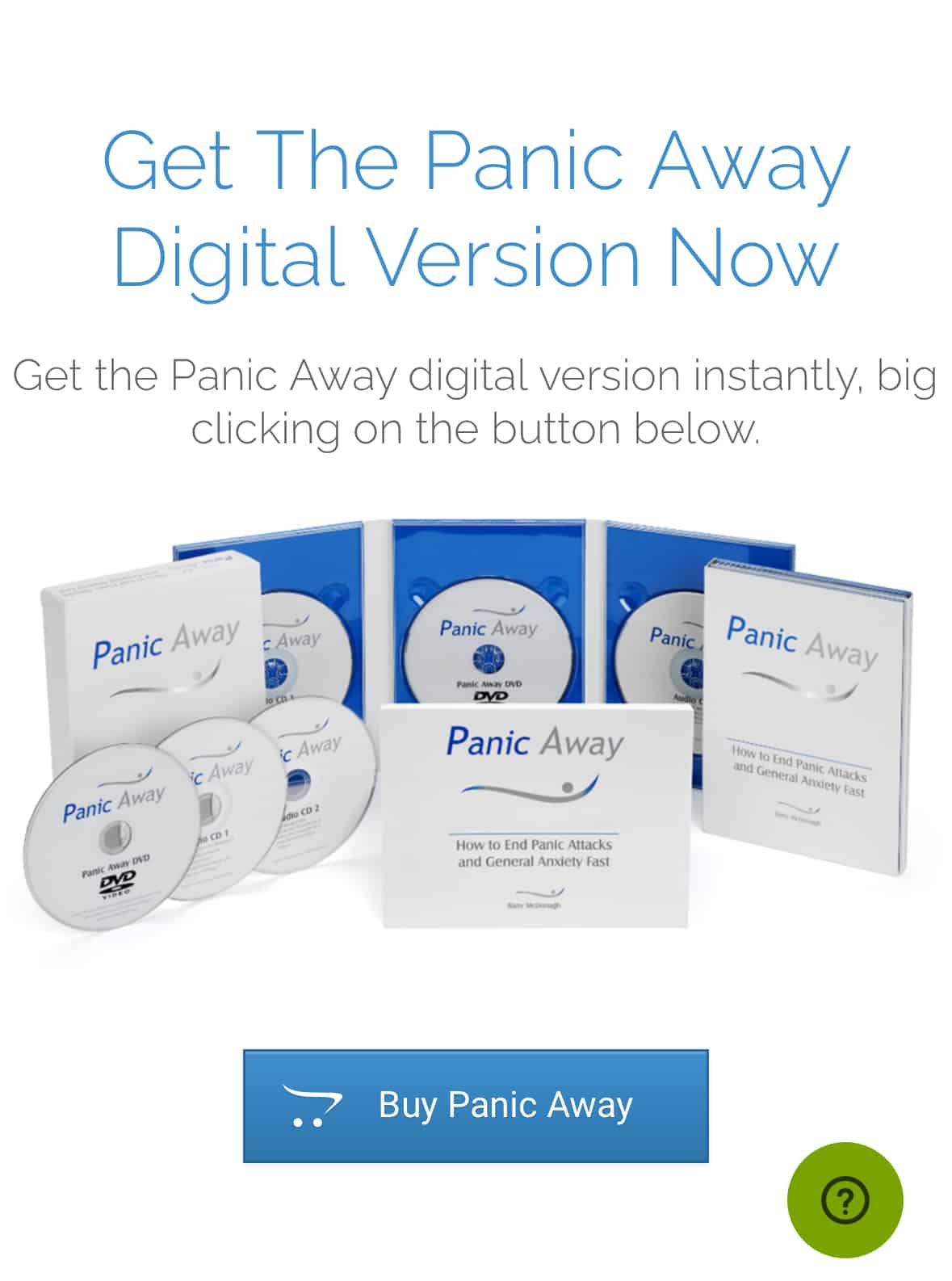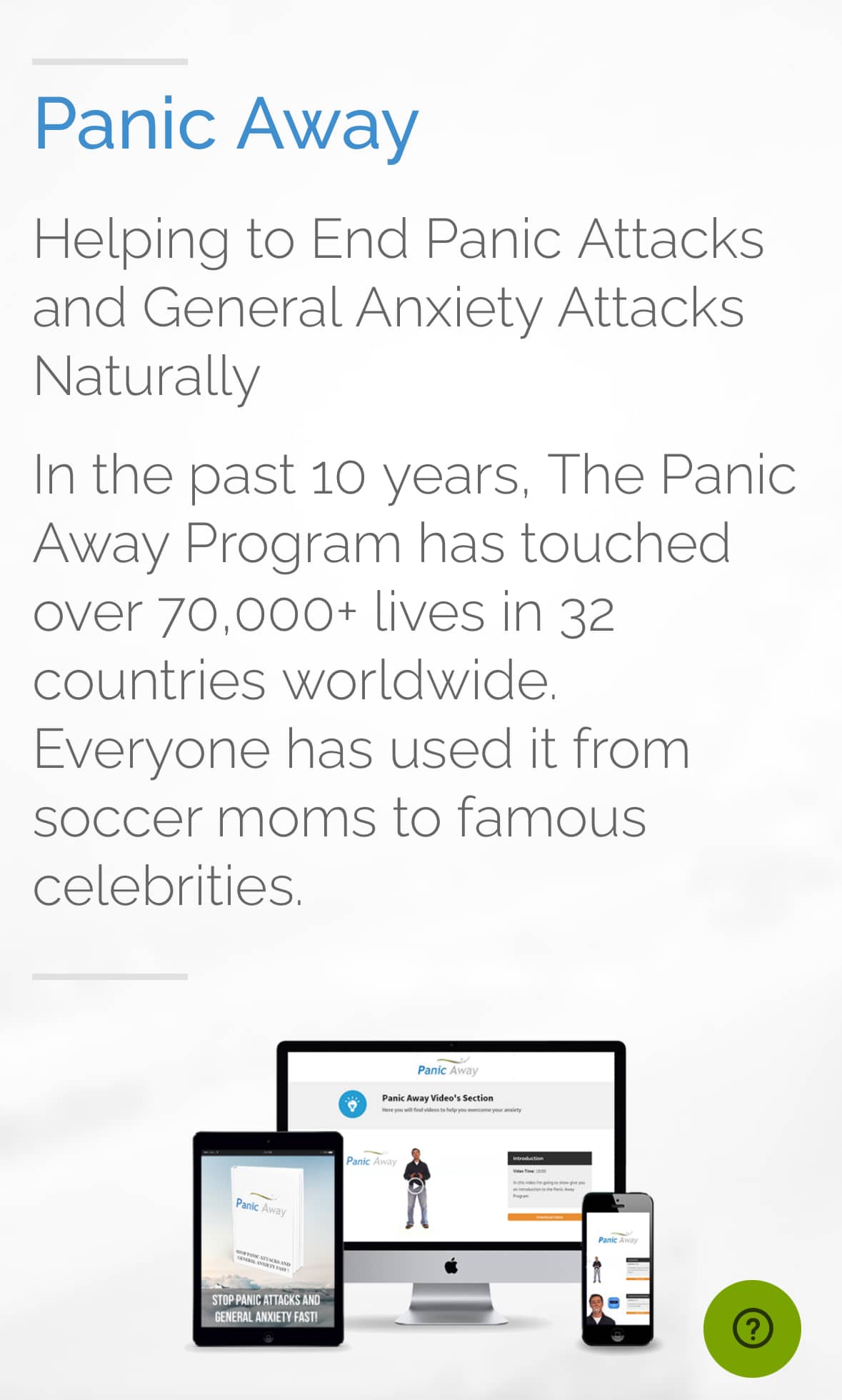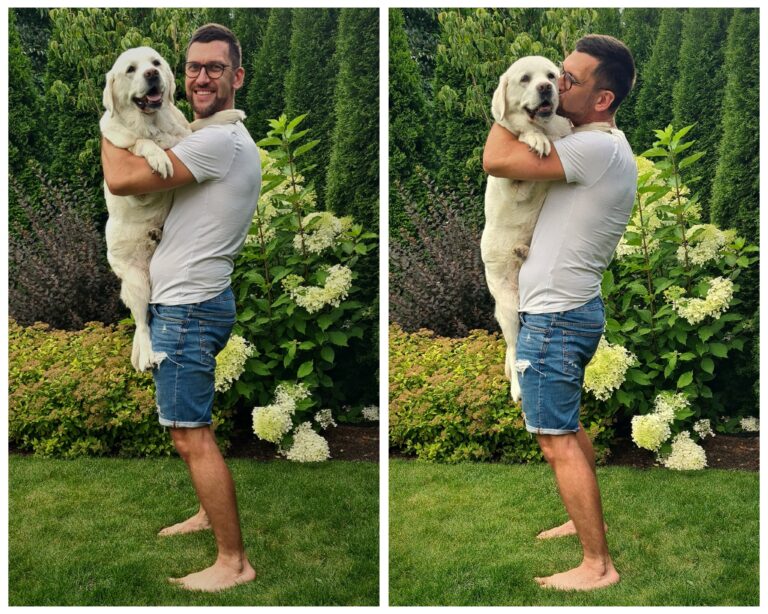Success Stories: Real-Life Experiences with ICBT

I’ve had Obsessive Compulsive Disorder my whole life. Was I aware of that? No. So when I went through a very dramatic diagnosis process I was quickly introduced to ERP as my main form of therapy.
I did a combination of both ERP with the values-based components of ACT. ERP helped me in ways I will never forget and components of it I still use to this day.
However, after doing consistent ERP for about 10 months I saw significant progress but I still felt a majority of my life absorbed by OCD.
By the time my therapist decided it was time to try something new, I would say I was about 70% better and 30% still in the OCD bubble, and although that’s great when it comes to mental health 30% is still a large amount to be carrying every day.

Ready to reclaim your life, one fearless step at a time? Your personalized path to anxiety-free living starts now!
Unlock your extraordinary future with PanicAway!
Don’t let anxiety define your story. Choose PanicAway, and step into a world bursting with limitless opportunities and unshakable self-assurance. Your personalized path to an extraordinary life is right here!
Meet PanicAway: Your Personal Roadmap to Liberation from Anxiety
Tired of letting anxiety steal the best moments of your life? It’s time to take charge and embrace a world filled with possibilities, free from fear and panic.
Why PanicAway is Your Perfect Ally in this Journey:
- Immediate Relief: Imagine those sleepless nights and crippling panic attacks becoming distant memories. PanicAway arms you with techniques for instant anxiety relief, putting you back in control.
- Empowerment from Within: It’s not about just managing anxiety; it’s about conquering it at its core. Rediscover your inner strength and emerge as a fearless, empowered version of yourself.
- Reclaim Your Freedom: Visualize a life where anxiety no longer dictates your choices. With PanicAway, you’ll savor the freedom to chase your dreams, explore the world, and seize every opportunity with unwavering confidence.
- Proven Success Stories: Join the community of individuals who’ve transformed their lives with PanicAway. You can be the next success story, and we can’t wait to celebrate your triumph!
- Comprehensive Support: You gain access to a treasure trove of resources, from life-changing e-books to enlightening audio guides. Plus, connect with kindred spirits on their own journeys to overcome anxiety.
It just felt like something was drastically missing. With ERP I was consistently taught both by my therapist and online advocates “You must sit in uncertainty”.
While yes that seems doable it was incredibly hard for me to sit with the idea of developing schizophrenia, being permanently in DPDR, having some kind of physical ailment, etc. With ERP I was okay
If I wasn’t thinking about it, so my life would be lived by living a values-based life and just having to constantly deal with these thoughts that I knew I’d never have a full answer to. But what I was missing was not that sense of certainty or answers to theses doubts it was the trust I had in myself.
When my therapist suggested ICBT I was skeptical at first because ultimately it sounded like a big compulsion fest but I trust my therapist with my life so I said “If you think it can help me let’s do it.”
My therapist also has OCD and was self-teaching herself ICBT while waiting to attend more training while simultaneously using the modality with me.
I say this part because even with a therapist who was just learning the modality I started noticing the effects of its teachings in a matter of weeks.
There was a bit of a learning curve going from ERP to ICBT especially because (although many think it’s the same it’s not) they have completely different schools of thought when it comes to OCD.
I went from leaning in and refocusing, attempting so hard not to do compulsions, seeing everything as a compulsion, thinking thoughts were random, and not checking; too lean in then understanding how I got there, pausing while allowing myself a choice, realizing not everything I do is a compulsion, understanding why I got latched to certain thoughts/doubts, and noticing but not getting sucked into the story.
Learning to trust me and focus on the things I know are true made a world of difference for me. The ability to have functional certainty and understand the how gave me the power and control back I didn’t even know I needed. I finally felt like I was understanding OCD better than it understood me and I’m not the only one.
Related Articles – ICBT: Your unofficial guide to reality instead of imagined possibility
Another OCD Warriors experience

I also wanted to share the benefits of a friend of mine who also did ICBT. Last summer a friend and I were talking and she was sharing about her mental health journey after I shared with her about my OCD.
After hearing her story I said to her “I am not yet a professional but I think it’s possible you have OCD.”
I explained I could never formally diagnose her so I provided her with my therapist’s number as she told me how much she was struggling. She ended up waiting about 6 more months to reach out but when she did she got the OCD diagnosis.
At this point, my therapist was doing much more ICBT work and my friend shared with me that this is the only modality they did. She started doing ICBT in March and as of writing this article she stated
“My mental health is overall largely improved and I feel more stable and capable than ever before”.
This was all possible and achieved by the use of ICBT as a stand-alone modality.
My biggest takeaways from using ICBT for my OCD
What I liked most about ICBT is you’re not running from thought. You can notice things, think things through, and bet on yourself.
With a disorder that is designed to make you doubt, I absolutely love having that functional certainty its wrong, and I can go on believing in myself.
Combining ICBT with Traditional Therapy: A Comprehensive Approach
ICBT falls under the CBT umbrella of modalities and most of the time these modalities can be used in conjunction with each other and the same goes for ICBT but in a different way.
From personal experience doing ERP and ICBT at the same time is very hard to make work due to the conflicting nature of the two modalities. Yet you can take components from each modality.
The goal of all modalities that are researched and used to treat OCD is to limit or completely stop compulsions; as we know compulsions keep OCD alive. The main difference is the approach to how we get there.
Clinicians can often use parts of each modality to help the client get through OCD. When teaching ICBT conversations about values and the importance of living in them may be discussed; this comes from ACT.
Going out and doing things you may have done before OCD took hold; this comes from ERP, diffusion from thoughts, this comes from CBT.
When it comes to integrating different modalities into ICBT I would never suggest a full-blown attempt at trying to use two at once but I would suggest the use of components from some if you feel it’s necessary for the client.
Related Articles – Hit and Run OCD: What it is and How to Overcome it
Frequently Asked Questions about ICBT for OCD

“Isn’t this reassurance/compulsive?”
Now I’m sure after reading all of this you have questions. The biggest question I often get from clients who are seasoned OCD therapy goers (myself included before I started this modality) is:
“Isn’t this reassurance?” and my answer to that is; it’s all about intention.
Like many things, anything can become compulsive, however, if you are doing ICBT the correct way it is not reassurance or a compulsion. As mentioned above we are looking at the function of our thoughts NOT the why.
When doing ICBT the main reason there is so much psychoeducation beforehand is for this exact reason. If I just had a client practice recognizing all the illogical things in their thoughts it wouldn’t even be ICBT it would be CBT.
The reason this is a long and slow process is to allow the brain to comprehend what it’s learning so we are less likely to get caught up in the story.
“Does I-CBT utilize exposures?”
No, ICBT does not utilize exposures in its treatments. Some might argue with me on this but exposures are intentional situations we place ourselves in to evoke anxiety and respond differently.
In ICBT if one of your compulsions is avoidance we will be working on getting you back into doing things you are avoiding but we wouldn’t call that an exposure.
ICBT likes to focus on the cognitive restructuring of that situation, by use of the techniques we teach you.
With that being said I see how some may say “Well that’s an exposure” and if you’d like to look at it that way go ahead but in my eyes, and how I frame it to my clients is you are just living your life while helping your brain unravel the inferential confusion you’ve experienced for so long.
“Isn’t ICBT CBT?”
Yes and no. ICBT falls under the cognitive-behavioral umbrella of modalities because it works on your cognition and how you behave, but it does not utilize many of the traditional CBT techniques.
As mentioned ICBT works upstream eventually helping the client stop at the doubt whereas many traditional CBT models will have the client dispute or deny the thoughts as well as go over the consequences/post thoughts.
ICBT focuses on understanding how we get to the place where we feel compelled to do compulsions. Understanding this narrative targets the faulty reasoning the clients experiencing. Once this is unraveled eventually the client won’t feel the need to have any reaction no matter the doubt.
Related Articles – What Will Happen if OCD is Left Untreated?
“What do you mean I can have functional certainty?”
I’m sure most of what you’ve experienced is this idea of living in uncertainty and while yes everyone experiences uncertainty a person with OCD does not have to experience more uncertainty than the average person.

Ready to reclaim your life, one fearless step at a time? Your personalized path to anxiety-free living starts now!
Unlock your extraordinary future with PanicAway!
Don’t let anxiety define your story. Choose PanicAway, and step into a world bursting with limitless opportunities and unshakable self-assurance. Your personalized path to an extraordinary life is right here!
Meet PanicAway: Your Personal Roadmap to Liberation from Anxiety
Tired of letting anxiety steal the best moments of your life? It’s time to take charge and embrace a world filled with possibilities, free from fear and panic.
Why PanicAway is Your Perfect Ally in this Journey:
- Immediate Relief: Imagine those sleepless nights and crippling panic attacks becoming distant memories. PanicAway arms you with techniques for instant anxiety relief, putting you back in control.
- Empowerment from Within: It’s not about just managing anxiety; it’s about conquering it at its core. Rediscover your inner strength and emerge as a fearless, empowered version of yourself.
- Reclaim Your Freedom: Visualize a life where anxiety no longer dictates your choices. With PanicAway, you’ll savor the freedom to chase your dreams, explore the world, and seize every opportunity with unwavering confidence.
- Proven Success Stories: Join the community of individuals who’ve transformed their lives with PanicAway. You can be the next success story, and we can’t wait to celebrate your triumph!
- Comprehensive Support: You gain access to a treasure trove of resources, from life-changing e-books to enlightening audio guides. Plus, connect with kindred spirits on their own journeys to overcome anxiety.
ICBT focuses on doubt instead of uncertainty; specifically obsessional doubt.
In ICBT we see uncertainty as a byproduct of an obsessional doubt, if there was no obsessional doubt there would be no uncertainty in the first place.
Again lets be clear this is not a modality of yes you can have certainty but more the understanding that the doubt we are having is irrelevant to the here and now, meaning I can have functional certainty in this moment, that I dont need to give more energy or attention to this doubt. ICBT still recognizes yes anything can happen but this is not the primary focus of our work.
It’s instead to recognize what inferences we are using that compel us into a story and eventually understand based on our common sense, logic, and 5 senses that disputing an idea that we already have a fair amount of certainty for is futile.
“Does ICBT work for every OCD theme?”
Yes, just like ERP ICBT does not see theme as the issue. OCD is OCD.
In ICBT we see inferential confusion and doubt as the problem.
A reminder Inferential confusion is when someone takes inferences they have experienced throughout their life and inserts them where they don’t belong to create evidence for a story.
Overall, this means they get sucked into imagined possibility instead of right here and now reality.
With that being said every OCD theme experiences Inferential confusion, heck every person experiences inferential confusion but those with OCD tend to get sucked in and experience Inferential confusion far more often.
Therefore if inferential confusion really is the problem and all themes experience it every theme can be helped with ICBT.
“Why does ICBT take so long before I get to learn how to help myself?”
ICBT is a cognitive approach and most cognitive approaches take a long time. ICBT is a slow process because it creates lasting results.
I get how this is difficult for many with OCD as I know personally how debilitating it is to have to live with this disorder day in a day out. But if you stick with it you’ll see helpful results.
As we know with the desperate want to get better sometimes clients will use ICBT for the wrong reason and it’s our job as clinicians to make sure you have a good base of psycho education and understanding of what we taught you before utilizing tools.
We want to make sure clients are not using ICBT compulsively because then were missing the point of the modality.
“Is ICBT the same as Internet-based cognitive behavioral therapy?”
No, unfortunately, they just share the same name.
Related Articles – The Ongoing Struggle: 257 Days of OCD and Intrusive Memories
Seeking Professional Support: Connect with Licensed ICBT Practitioners

When seeking a provider who uses ICBT it may be hard to find. With this modality being so new to the US there are many practitioners who use it or are learning it and it should become more widely available soon. However, a good place to start is again on the ICBT website.
On the site they have a list of practitioners who have been trained in ICBT; this list extends all over the world and specifically for each state in the US. Beyond that Instagram again is a great place to find practitioners.
You can follow or contact the above clinicians in this article in an attempt to get therapeutic support or use the hashtag ICBT on Instagram to see and find more great clinicians offering this modality.
Related Articles – Is OCD Treatable Without Medication?
Final thoughts on ICBT
No matter what modality you choose your OCD will get exponentially better. In my opinion, ICBT has a great way of helping clients gain back self-trust, no longer believing the games OCD is playing. With a disorder that is so difficult, I am just so glad there are more options.
This is why I speak so highly of ICBT both because I do think it’s a great modality but also because I know personally the pain of thinking “If this doesn’t work that’s it” when I only had ERP.
Simply knowing I had more options made a world of difference in my level of hopelessness. The reality of it is not all brains are the same so they shouldn’t be treated that way.
I am proud of you for continuing even when it feels hard and if you are struggling know you have options.





